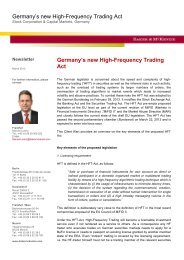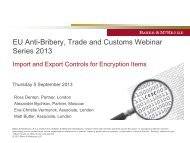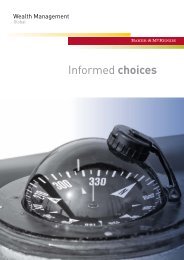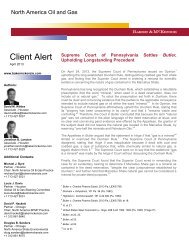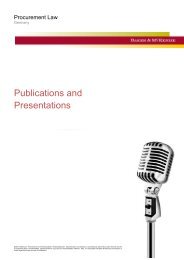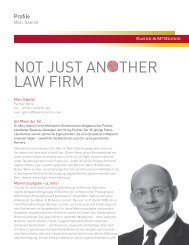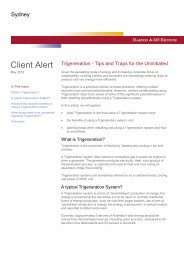Read publication - Baker & McKenzie
Read publication - Baker & McKenzie
Read publication - Baker & McKenzie
You also want an ePaper? Increase the reach of your titles
YUMPU automatically turns print PDFs into web optimized ePapers that Google loves.
ii<br />
Criminal tax prosecutions<br />
Canada<br />
The distinction between criminal and civil tax matters is significant to the dispute<br />
resolution process because there are extensive constitutional and procedural protections<br />
that apply only in the criminal context. 13 Criminal tax prosecutions will arise only after<br />
the formal laying of charges under a federal statute 14 and normally proceed in provincial<br />
courts of general jurisdiction. Although charges relating to less serious ‘summary<br />
conviction’ offences must be laid within eight years of the purported offence, 15 there is<br />
no equivalent limitation period for the more serious ‘indictable’ class of offences.<br />
III<br />
THE COURTS AND TRIBUNALS<br />
i Objections to federal tax assessments<br />
A taxpayer’s objection will be considered ‘with all due dispatch’ 16 by the CRA’s Appeals<br />
Branch. This branch is an independent internal division of the CRA mandated to conduct<br />
an impartial and expeditious review of the objection and the underlying assessment. The<br />
taxpayer will have the opportunity to engage in significant negotiations with the Appeals<br />
Branch, during which time the taxpayer may decide to submit new information and<br />
documentation in support of its objection. 17 Once the Appeals Branch completes its<br />
review, it will confirm, vary or vacate the initial assessment, or will otherwise reassess the<br />
taxpayer. 18 If the taxpayer continues to dispute the assessment (or any reassessment issued<br />
in response to its objection), or if 90 days have passed from the date of the objection<br />
and the CRA has yet to complete its review, the taxpayer has the option of appealing the<br />
assessment directly to court without further negotiating with the CRA. 19<br />
13 See Guindon v. Canada for a recent discussion of the classification of tax penalties (2012 TCC<br />
287, appeal pending).<br />
14 Both Parliament and the provincial legislatures also have the authority to create ‘quasi-criminal’<br />
or regulatory offences. These assist in maintaining high standards of public health, safety and<br />
order in a limited sphere of activity, but do not relate to acts or omissions considered truly<br />
wrongful in a moral sense. In general terms, regulatory offences incorporate a lower threshold<br />
of wrongdoing and attract fewer procedural protections, less-significant penalties and less social<br />
stigma than federal criminal offences.<br />
15 See s. 244(4).<br />
16 There is no formal time period for processing an objection, but there exists a developing body of<br />
jurisprudence interpreting the CRA’s obligations to issue assessments and respond to objections<br />
in a timely manner.<br />
17 The taxpayer may also generally submit new information or documents at the Tax Court appeal<br />
stage, but a variety of potential negative consequences may flow from a taxpayer’s failure or<br />
refusal to provide information to the CRA at earlier stages.<br />
18 See s. 165(3). In practice, a reassessment to increase taxes payable will not be made in response<br />
to an objection as a matter of administrative practice or because reassessment is statute-barred.<br />
19 See s. 169(1). An appeal to the Tax Court must normally be initiated within 90 days from the<br />
day the CRA sends the taxpayer notice that it has confirmed the assessment or has reassessed in<br />
response to an objection.<br />
25





